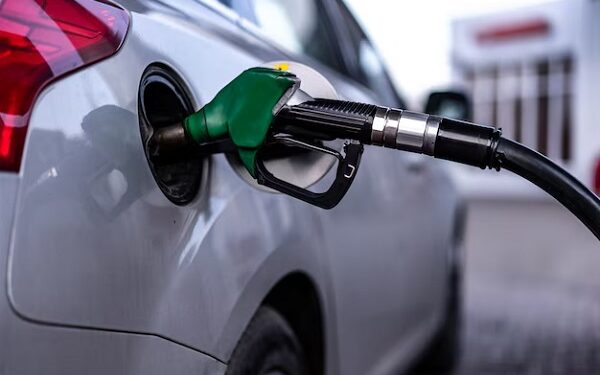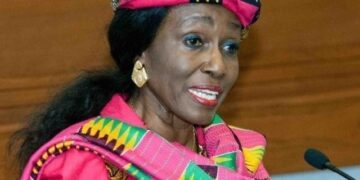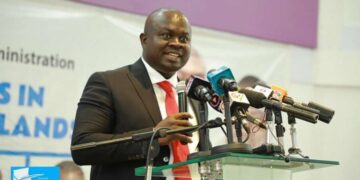ABUJA, Oct 31 (The African Portal) – Petroleum marketers have warned that the pump price of Premium Motor Spirit, popularly called petrol, could exceed N1,000 per litre following President Bola Tinubu’s approval of a 15 per cent ad valorem import tariff on fuel imports.
The new policy, which takes effect after a 30-day transition period expected to end on 21 November 2025, is part of the government’s strategy to protect local refiners and reduce the influx of cheaper imported products that threaten domestic refining investments.
However, marketers say the move could backfire and push retail prices beyond the reach of average Nigerians.
Commenting in a telephone interview on Thursday, multiple depot operators with knowledge of the matter, who spoke on condition of anonymity, said the decision could further raise the price of petrol, which already sells for around N920 per litre, in many parts of the country.
“As it is, the price of fuel may go above N1,000 per litre. I don’t know why the government will be adding more to people’s suffering,” one of the depot operators said.
Another depot operator added, “Unfortunately, some of the importers are working in alignment with Dangote, which is why the last price increase was general; all players raised their prices at once. Let’s just wait and see what happens next.”
Another operator added that without a clear framework to stabilise market forces and ensure fair competition, the new import duty could trigger another round of price hikes and worsen the hardship faced by consumers.
The National Vice-President of the Independent Petroleum Marketers Association of Nigeria, Hammed Fashola, also agreed that the tariff had its implications, saying it might lead to a price surge.
Fashola said the policy had both positive and negative effects, adding that it could discourage importation while promoting local refining.
The IPMAN leader opined that some marketers moght perceive it as an opportunity to monopolise the sector in favour of Dangote and a few other refineries.
“The 15 per cent tariff on imported fuel has its own implications. Maybe the price will go up, and equally, it will discourage importers from bringing in fuel if it becomes too costly.
“But it has both negative and positive effects on the sector. I see that the government is trying to protect local refiners, but it will have its own implications because people will see it as a way of monopolising the industry for certain people. At the same time, the government aims to protect the local refiners.”
However, Fashola stressed that the failure of the local refiners to supply enough fuel into the domestic market could trigger a fuel crisis.
“If the local refiners fail, it will have its own implications. It may lead to scarcity, and people will not have an alternative. So, it has both positive and negative effects. That’s the way I see it,” he added.
On whether the development is in line with the Petroleum Industry Act, Fashola said, “I don’t think the government will do anything outside the law. They would not like to do anything against the PIA. Ordinarily, everybody would like to see that our local refineries are surviving and they are doing well, which is good for our economy. I don’t think it has anything to do with the PIA.”
In his advice to local refiners, especially the Nigerian National Petroleum Company Limited, Fashola urged them to live up to expectations. He sought the revamp of the Port Harcourt, Warri and Kaduna refineries.
“My advice or my prayer is to the new management of NNPC: the way they are going, I think they are going in the right direction, and they have to do it fast by bringing in investors to revive our refineries. If all NNPC refineries can come on board, it will solve a lot of problems. I hear people trying to say that maybe they’re going to practise monopoly, but that will not be there. This applies to other private refineries like BUA; when they are able to come up, I think that the fear of monopoly will not be there anymore. There will be competition among the refineries, and that will be good for us,” Fashola stated.
Meanwhile, the National President of the Petroleum Products Retail Outlet Owners Association of Nigeria, Billy Gillis-Harry, described the 15 per cent tariff as a win-win situation, stressing that the policy would be tested, though it is not a totally new policy.
“Our expectation is that at some point, it might be reviewed. We are looking for product availability and affordability. We must always keep an eagle eye on these two things. That’s what PETROAN will advise at this time. I want Nigerians to know that if we are looking for cheap fuel and we are driving everybody out of the business, the product will not be available, and then prices will skyrocket.
“As it is today, everybody is working with Dangote, and we know that Dangote cannot satisfy the country. So, there has to be a mix of product availability,” he added.
The PUNCH had earlier reported that President Tinubu approved the introduction of a 15 per cent ad valorem import duty on petrol and diesel imports into Nigeria.
The initiative is aimed at protecting local refineries and stabilising the downstream market. In a letter dated 21 October 2025, reported publicly on 30 October 2025, and addressed to the Attorney-General of the Federation and Minister of Justice, the Federal Inland Revenue Service and the Nigerian Midstream and Downstream Petroleum Regulatory Authority, Tinubu directed the immediate implementation of the tariff as part of what the government described as a “market-responsive import tariff framework.”
The letter, signed by his Private Secretary, Damilotun Aderemi, and obtained by our correspondent on Thursday, conveyed the President’s approval following a proposal by the Executive Chairman of the FIRS, Zacch Adedeji.
The proposal sought the application of a 15 per cent duty on the cost, insurance and freight value of imported petrol and diesel to align import costs with domestic market realities. The tariff is separate from the additional 5 per cent surcharge to be charged on locally produced and imported fuel in the new tax act, starting January 2026.
Adedeji, in his memo to the President, explained that the measure was part of ongoing reforms to boost local refining, ensure price stability, and strengthen the naira-based oil economy in line with the administration’s Renewed Hope Agenda for energy security and fiscal sustainability.
According to projections contained in the letter, the 15 per cent import duty could increase the landing cost of petrol by an estimated N99.72 per litre, based on an average daily consumption of 19.26 million litres as of September 2025. This translates to an additional N1.92bn in daily import costs and revenue to government coffers.
The letter read, “At current CIF levels, this represents an increment of approximately N99.72 per litre, which nudges imported landed costs towards local cost recovery without choking supply or inflating consumer prices beyond sustainable thresholds. Even with this adjustment, estimated Lagos pump prices would remain in the range of N964.72 per litre ($0.62), still significantly below regional averages such as Senegal ($1.76 per litre), Côte d’Ivoire ($1.52 per litre), and Ghana ($1.37 per litre).”
It added that payments are to be made into a designated Federal Government revenue account managed by the Nigeria Revenue Service, with verification and clearance oversight by the Nigerian Midstream and Downstream Petroleum Regulatory Authority.
“The core objective of this initiative is to operationalise crude transactions in local currency, strengthen local refining capacity, and ensure a stable, affordable supply of petroleum products across Nigeria,” Adedeji stated.
The FIRS boss also warned that the current misalignment between locally refined products and import parity pricing has created instability in the market.
“While domestic refining of petrol has begun to increase and diesel sufficiency has been achieved, price instability persists, partly due to the misalignment between local refiners and marketers,” he wrote.
He noted that import parity pricing, the benchmark for determining pump prices, often falls below cost recovery levels for local producers, particularly during foreign exchange and freight fluctuations, putting pressure on emerging domestic refineries.
Adedeji added that the government’s responsibility was now “twofold: to protect consumers and domestic producers from unfair pricing practices and collusion, while ensuring a level playing field for refiners to recover costs and attract investments.”
He argued that the new tariff framework would discourage duty-free fuel imports from undercutting domestic producers and foster a fair and competitive downstream environment.
The policy comes as Nigeria intensifies efforts to reduce dependence on imported petroleum products and ramp up domestic refining.
The 650,000 barrels-per-day Dangote Refinery in Lagos has commenced diesel and aviation fuel production, while modular refineries in Edo, Rivers and Imo states have started small-scale petrol refining.
However, despite these gains, petrol imports still account for up to 69 per cent of national demand during the 15 months between August 2024 and 10 October 2025.
The FIRS boss noted that the policy is not revenue-driven but corrective, introduced to align import costs with local production realities and prevent duty-free imports from undercutting domestic refineries that are just beginning to recover.
“While domestic refining of PMS has begun to increase and diesel self-sufficiency has been achieved, price instability persists,” the memo stated. “Import parity remains the benchmark for pricing but often sits below the cost-recovery point of local producers, particularly during currency and freight fluctuations.”
It warned that if left unchecked, these pricing distortions could undermine the viability of local refining at a critical time when investors are beginning to return to the sector following years of dormancy.
The new framework, the document added, is expected to encourage fresh investment in refining, storage, and logistics infrastructure while ensuring that local producers and marketers operate on a level playing field.
The tariff is backed by Sections 21 and 22 of the Petroleum Industry Act, which empower the NMDPRA to impose public service obligations on licensees to promote national energy security and economic development. Under Section 3(4) of the PIA, the President is also empowered to issue policy directives to the regulator to enforce such measures.
Credit: Punch






